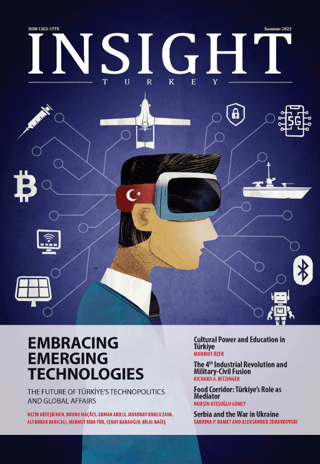Insight Turkey Summer 2022 Embracing Emercing Technologies

A New Issue of Insight Turkey Has Been Published!
In the new special issue of Insight Turkey, we endeavored to explore as many facets as possible of the interplay between new technology advancements and Turkish technopolitics. Within this context, this issue includes 8 research articles and 2 commentaries, covering a wide range of topics that are all important to the relationship between technological advancements and global politics.
In his inquisitive commentary, Richard A. Bitzinger seeks to illustrate how the technologies incorporated into the upcoming 4th industrial revolution, and AI, in particular, promise to represent a radical paradigm shift in the form and conduct of combat in the future. In this regard, Javadbay Khalilzade’s research article describes how UAVs or combat drones have proliferated and how this has changed and shaped modern warfare.
Erman Akıllı’s piece launches a stimulating conversation about the future success of the Metaverse, which depends on the creation of universes that are founded on global organizations or regional integrations rather than monopolization. In the same vein, Mehmet Rıda Tür makes the prediction that AI will soon overtake humans as the primary decision-makers in the energy sector. In our second on-topic commentary Bruno Maçães challenges readers to consider climate change and its impact on global politics bravely and originally, arguing that the solution to the climate emergency is not to exit the Anthropocene but, intriguingly, to enter it for the first time.
The research article written by Nezir Akyeşilmen investigates the documents, policies, strategies, measures, and organizational structures of Türkiye’s national cybersecurity strategy and argues that Türkiye’s technical performance is relatively weaker than its legal performance. Meanwhile, Ali Burak Darıcılı evaluates the Turkish National Intelligence Organization’s increasing operational capacity in the context of high-technology products.
As we shine a spotlight on the economy in the post-COVID-19 era, while Bilal Bagis focuses on the ways a new instrument, central bank digital currency, is projected to improve contemporary payment systems, strengthen the effectiveness of the monetary policy, and assure financial stability, Cenay Babaoğlu questions how the pandemic process has affected the increasing digitalization of public administrations with the rising use of technology in administrative functions. In a similar spirit, Narmina Mamishova research article examines Türkiye’s vaccine diplomacy and its role in the country’s efforts to maintain and expand its stakes in the global power configuration.
Mahmut Özer, Nurşin Ateşoğlu Güney Sabrina P. Ramet and Aleksander Zdravkovski present three off-topic commentaries enriching the scope of our special issue with an emphasis on the higher education in Türkiye and the Ukrainian-Russian war.
We hope and believe that the insightful and stimulating debates raised on the issue will be helpful to our readers.
A New Issue of Insight Turkey Has Been Published!
In the new special issue of Insight Turkey, we endeavored to explore as many facets as possible of the interplay between new technology advancements and Turkish technopolitics. Within this context, this issue includes 8 research articles and 2 commentaries, covering a wide range of topics that are all important to the relationship between technological advancements and global politics.
In his inquisitive commentary, Richard A. Bitzinger seeks to illustrate how the technologies incorporated into the upcoming 4th industrial revolution, and AI, in particular, promise to represent a radical paradigm shift in the form and conduct of combat in the future. In this regard, Javadbay Khalilzade’s research article describes how UAVs or combat drones have proliferated and how this has changed and shaped modern warfare.
Erman Akıllı’s piece launches a stimulating conversation about the future success of the Metaverse, which depends on the creation of universes that are founded on global organizations or regional integrations rather than monopolization. In the same vein, Mehmet Rıda Tür makes the prediction that AI will soon overtake humans as the primary decision-makers in the energy sector. In our second on-topic commentary Bruno Maçães challenges readers to consider climate change and its impact on global politics bravely and originally, arguing that the solution to the climate emergency is not to exit the Anthropocene but, intriguingly, to enter it for the first time.
The research article written by Nezir Akyeşilmen investigates the documents, policies, strategies, measures, and organizational structures of Türkiye’s national cybersecurity strategy and argues that Türkiye’s technical performance is relatively weaker than its legal performance. Meanwhile, Ali Burak Darıcılı evaluates the Turkish National Intelligence Organization’s increasing operational capacity in the context of high-technology products.
As we shine a spotlight on the economy in the post-COVID-19 era, while Bilal Bagis focuses on the ways a new instrument, central bank digital currency, is projected to improve contemporary payment systems, strengthen the effectiveness of the monetary policy, and assure financial stability, Cenay Babaoğlu questions how the pandemic process has affected the increasing digitalization of public administrations with the rising use of technology in administrative functions. In a similar spirit, Narmina Mamishova research article examines Türkiye’s vaccine diplomacy and its role in the country’s efforts to maintain and expand its stakes in the global power configuration.
Mahmut Özer, Nurşin Ateşoğlu Güney Sabrina P. Ramet and Aleksander Zdravkovski present three off-topic commentaries enriching the scope of our special issue with an emphasis on the higher education in Türkiye and the Ukrainian-Russian war.
We hope and believe that the insightful and stimulating debates raised on the issue will be helpful to our readers.




